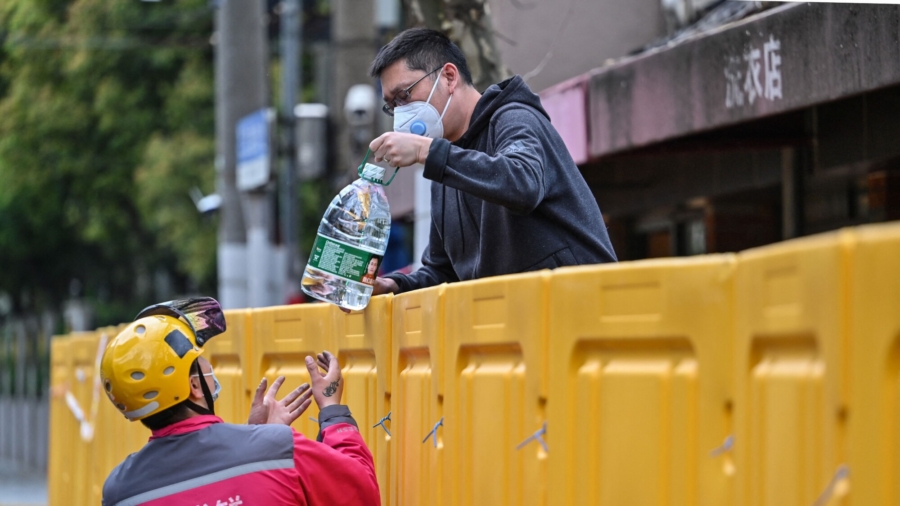For many living in Shanghai, the city’s tough quarantine measures are proving to be unbearable as they struggle to cope with life without enough basic necessities such as food and medication.
Wan Wenying, 56, a resident of Shanghai’s Baoshan district, told The Epoch Times on March 29 that she was short on food after local officials refused to help her.
“Our building was sealed off yesterday but our residential compound has been sealed off for four days,” Wan said, adding that residents in her building had been required to take nucleic acid tests to see if they were infected with COVID-19.
She said she sought out local community officials to help her get some food, but was told that she had to deal with the problem on her own.
One official told Wan to have cooked meals delivered to her house, but she said she couldn’t afford the cost since she doesn’t have any income and is not entitled to social benefits.
“The government doesn’t care if its people are alive or dead. I don’t have any money and I am stuck at home,” Wan said.
According to China’s state-run media, Chinese authorities placed Baoshan under “seal-off management” from March 26 to 28.

Outbreak
Baoshan is one of many areas in Shanghai hit hard by the spread of the Omicron variant of the CCP (Chinese Communist Party) virus, commonly known as the novel coronavirus. Shanghai has a population of about 26 million people.
Shanghai reported 4,477 new infection cases on March 28, before reporting 5,982 new cases the next day. However, the actual number of inflection cases in the city could be much higher, considering that experts have said that China’s actual COVID-19 death toll should be higher than the Chinese official figures.
The escalating Omicron outbreak prompted the municipal government in Shanghai to announce a two-stage lockdown on March 27. Under the measure, the city is divided into two halves—one east of the city’s Huangpu River and the other to its west—for health workers to carry out mass testing of local residents.
Those living east of the river, in areas including districts of Punan and Pudong, would be prevented from leaving their homes from March 28 to April 1. Residents in the Puxi area, located west of the river, would be barred from going out from April 1 until April 5. Baoshan is located north of Puxi.
The Chinese regime is implementing a “zero-COVID” policy, using mass tests to go after every virus case regardless of economic or psychological costs.
On Wednesday, Shanghai authorities said they had conducted 9.1 million nucleic acid tests since the lockdown began on March 28.
However, Shanghai authorities began imposing tight measures on residents living west of the river on March 30, ahead of the scheduled April 1 starting date.
For example, some residents received notice from their housing committees on Tuesday, saying that they would be prevented from leaving their compounds for the next seven days.
“We will resume normal life soon, but in the next period of time we ask everyone to adhere closely to pandemic control measures, do not gather, and reduce movements,” according to one housing committee notice seen by Reuters.
The outbreak has forced U.S. automaker Tesla, Irish automotive supplier Aptiv, and German auto component maker Thyssenkrupp to shut down their plants in Shanghai. Japanese apparel giant Uniqlo has also closed many of its stores in the city.

Residents
Some Shanghai residents are struggling to receive proper medical care amid the outbreak in their city.
Lin Mei, a local resident living in Shanghai’s Pudong district who asked to use a pseudonym, told The Epoch Times on March 28 that the lockdown came as a surprise, and said the city’s authorities should have warned them ahead of time so they could stock up.
Lin, who is nearly 60 years old, said local authorities should be considerate to seniors like her, since many of them need nonstop medical attention. As for her, she said she has been suffering from kidney stone pain for over 10 years.
“Last week, my kidney stone disease acted up again. I wanted to go see urologists at major hospitals but their services were suspended,” she said. “I went to a small clinic but the doctor’s prescription drugs were not powerful enough to subdue my pain.”
“So the pain persisted and I ended up having a fever,” Lin said, before adding that all she could do now was drink plenty of water since she couldn’t go out.
Yang Lei, who also asked to use a pseudonym, complained that local food prices have dramatically increased, in an interview with The Epoch Times on March 28. Yang lives in Jing’an, a district located west of Huangpu River.
She said she could still go out but some of her neighbors couldn’t. She explained that two buildings in her neighborhood have been sealed off after one resident in each building tested positive for COVID-19.
Some food, like eggs, meat, and vegetables, have become expensive at her local markets, Yang said, while others like instant noodles were out of stock.
In her view, Yang said that outbreaks in China wouldn’t be as bad if the Chinese officials cared more about the people.
“The Chinese [regime’s] governing principle is not about ensuring people’s livelihood at all,” she said. “In the name of serving the people, it actually works for money.”
Reuters, Zhao Fenghua, and Hong Ningcai contributed to this report.
From The Epoch Times


